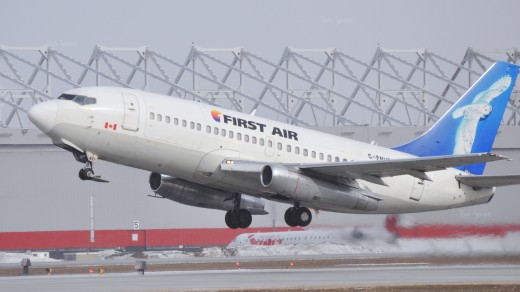The Transportation Safety Board says the first officer of First Air Flight 6560 twice suggested his captain abort a landing at Resolute Airport but his increasingly tense pleading was either ignored or misunderstood by the flying pilot.
A few seconds after the cockpit voice recorder recorded the FO calling the captain by name and saying “I don’t like this” the Boeing 737-201 hit a hill about two km. east of the midpoint of the runway the flying pilot thought he was on approach to. All four crew and eight of 11 passengers were killed as the airliner split into three pieces and caught fire.
The TSB said compasses that were out by 17 degrees and an incorrectly set autopilot caused the initial confusion leading to the crash but focused much of its report on the growing disconnect between the two pilots as the approach deteriorated.
The FO seemed to have a good handle on the circumstances and expressed doubts early in the approach. But the TSB said the captain either didn’t grasp the seriousness of the FO’s comment or disagreed with him and pressed an approach that was well to the right of the runway centreline.
“There was a number of exchanges between the two pilots in a span of a minute and 20 seconds or so, but part and parcel to that exchange was there was no concrete suggestion or direction from the co-pilot about a go-around,” Brian MacDonald, the lead investigator into the crash, said at a news conference Tuesday.
The TSB said First Air didn’t properly train its pilots in crew resource management and that may have caused the FO to hold back in his interaction with the captain on this flight.
“The first officer made many attempts to communicate his concerns and suggest a go-around…. The suggestion was not sufficiently assertive at a time when an escalation of communication was needed, and did not convince the captain to discontinue the approach,” the investigation found.
“In the absence of clear policies or procedures allowing a first officer to take control, this first officer likely felt inhibited from doing so.”
First Air says it has revamped training and added better navigation gear in response to the crash.
“When you have something like this happen, you take a hard look in the mirror and put your whole operation under a microscope,” Chris Ferris, First Air’s executive vice president told CBC News North. “We have taken definite lessons from this accident. It’s something none of us want to go through again.”

